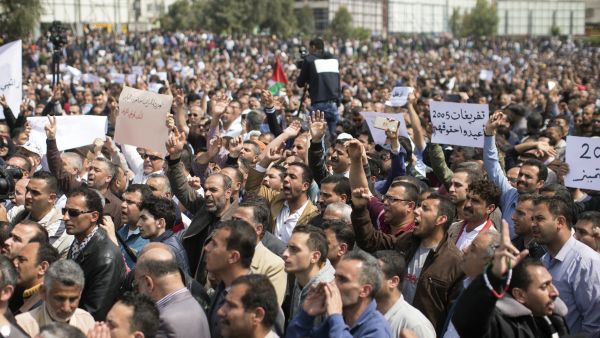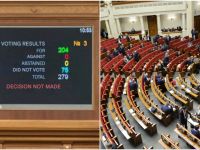“I arrived at the bank and only then found out there had been a pay cut. There was no information from the government at all beforehand,” Palestinian civil servant Mohammed Deeb, 43, says.
He was one of many employees of the Ramallah-based Palestinian government (also known as the Palestinian Authority, or PA) who took to the streets of Gaza over the weekend to protest a 30% cut in their salaries.
Speaking by phone from Gaza, he described what such a cut meant.
“Even before, 2000 Shekels ($550) a month wasn’t enough. I was borrowing from my brothers $275 every month. I have five children, a house, medical bills for a sick wife. The rent and electricity alone are $300. With these cuts, my salary is now only 1200 Shekels ($330). It’s a big problem.”
The cuts come as the Palestinian government faces severe financial difficulties as the international aid they rely on decreases. The Ramallah authorities also blame the Hamas-run government of Gaza for not passing on taxes they collect.
The West Bank and Gaza have been run by separate authorities since 2007, when Hamas took control of Gaza. Hamas beat Fatah, the faction that controls the West Bank government, in Palestinian elections in 2006 but the result was not recognised by the international community.
Palestinian civil servants in Gaza who refused to work for the new Hamas authorities kept receiving some of their salaries from the Ramallah government.
“Until 2007 everything was good,” Deeb said. “I had a salary of $950, plus benefits. It was only after that the troubles started. The salary was cut and the benefits were taken away.”
Last week’s decision to cut the salaries caused widespread anger in Gaza, with thousands demonstrating in Gaza City on Saturday to demand their wages be returned to their normal level:
Gazan government employees were sceptical of the government’s claim that the cuts were due to a financial crisis, pointing out that the cuts only applied to them and not to West Bank employees.
“It’s not fair that the employees in Gaza suffer while those in the West Bank carry on with the same salary,” Deeb said.
A message circulating on Whatsapp on Sunday in Gaza had a harsh message for the Ramallah government: “Don’t talk about patience when you live in palaces.”
Grant Rumley, a research fellow at Foundation for Defense of Democracies, put the Palestinian government’s financial troubles in context: “There's a lot of scrutiny in the US and Israel on portions of the PA budget that are going to families of prisoners and “martyrs”, and I think there's a realization that US aid and Israel's transfer of tax revenues are threatened if they don't cut those aspects of the budget, which seems unlikely.”
The Palestinian government pays hundreds of millions of dollars a year to the families of Palestinians killed, injured or imprisoned during the long-running conflict with Israel.
Israel sees the money as incentivizing violence. Palestinians disagree, seeing the fund as a social security net for families who have suffered under Israel’s occupation.
“The cuts in Gaza could possibly be the first step in a series of austerity measures taken by the PA to address this decline in aid.”
The cuts are likely to worsen the socioeconomic situation in Gaza, where unemployment and poverty are already rampant. The enclave has been blockaded by Israel since the Hamas takeover in 2007, and has suffered through three wars in ten years.
Rumley said that the cuts added to the risk of a return to violence. “The Israeli comptroller report specifically pointed out the humanitarian situation in Gaza as a key factor in the run-up to the 2014 war, and that situation has only deteriorated since.”
“Now you have a Hamas leadership undergoing a potential hard-line shift and a public increasingly frustrated with both sets of [Palestinian] leadership. Taken together, it's a potentially combustible situation.”
In the meantime, it is ordinary Palestinians like Deeb who are left wondering what comes next and how to make ends meet.
“All I want is my rights,” he said. “My rights and a dignified life.”
Jacob Burns
Follow the Loop on Twitter and Facebook







